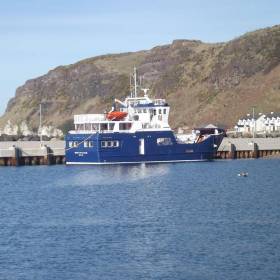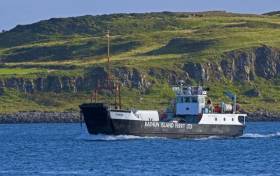Displaying items by tag: New car ferry
#EntersService – The new custom-built car ferry Spirit of Rathlin has finally entered service with a first scheduled sailing today on the Rathlin Island link with Ballycastle on the Antrim mainland, writes Jehan Ashmore.
Spirit of Rathlin built by Arklow Marine Services at cost of £2.8m entered the route which caters for 6 vehicles and 140 passengers. The 28m long newbuild directly replaced the ageing Canna which performed a final crossing last night concluding two decades of loyal service.
The introduction of Spirit of Rathlin is based on a 10 year contract to Rathlin Ferry Co. This was awared to the ferry company following a tender process from Northern Ireland’s Department for Infrastructure (dfi) that funded the ferry.
Spirit of Rathlin is a boost to islanders and tourists alike as the new ferry offers better accommodation in the form of a saloon lounge area (seating 42) on the main deck. On the above decks 1 and 2, there is additional seating outside to take in the scenic views across Rathlin Sound.
In terms of freight he ‘Spirit’ will have the ability to convey an articulated truck and the newcomer will not be alone as the is also the passenger-only fastcraft Rathlin Express.
Prior to today’s opening, as previously reported on Afloat the new ferry had undergone further works at Mooney Boats, Killybegs. The work involved the use of the Donegal yard's syncro-lift.
In recent months, essential crew training was carried out before the Spirit of Rathlin was permitted a MCA certification. Also improvements to berthing infrastructure had to be completed in Ballycastle Harbour to accommodate the new ferry.
Rathlin Island Service Continues With 'Canna' While New Carferry Undergoes Crew Training
#Old&Newferry – Ferry services to Rathlin Island are operating though the new carferry Spirit of Rathin built in Arklow, remains undergoing essential crew training and certification from the Maritime Coastguard Agency, writes Jehan Ashmore.
The £2.8 newbuild car ferry built by Arklow Marine Service, is expected to enter service in a couple of weeks according to the Rathlin Ferry Co. The six-car vessel also capable of handling an articulated truck and 140 passengers, will use the new £1 million berthing facility spent on improving Ballycastle Harbour. Introduction of the newbuild will improve the standards of service for the island’s population of 110 and visitors boosting the local economy.
Current operations are been maintained by car ferry Canna and a relief 'passenger-only' ferry on Ballycastle-Rathlin Island (Church Bay) route. This passenger-only ferry has replaced the larger Rathlin Express while away in dry-dock. Afloat has identified that this larger fastferry is undergoing works at Mooney Boats in Killybegs.
Spirit of Rathlin will replace Canna, a Caledonian Maritime Assets Ltd’s (CMAL). The car ferry since 1997 has served on the Sea of Moyle that separates the mainland and the island.
The ‘Island’ class car ferry named after the Scottish island was built in 1976. Originally the five-car ferry began service for Caledonian MacBrayne (CalMac) on the Western Isles routes.

























































